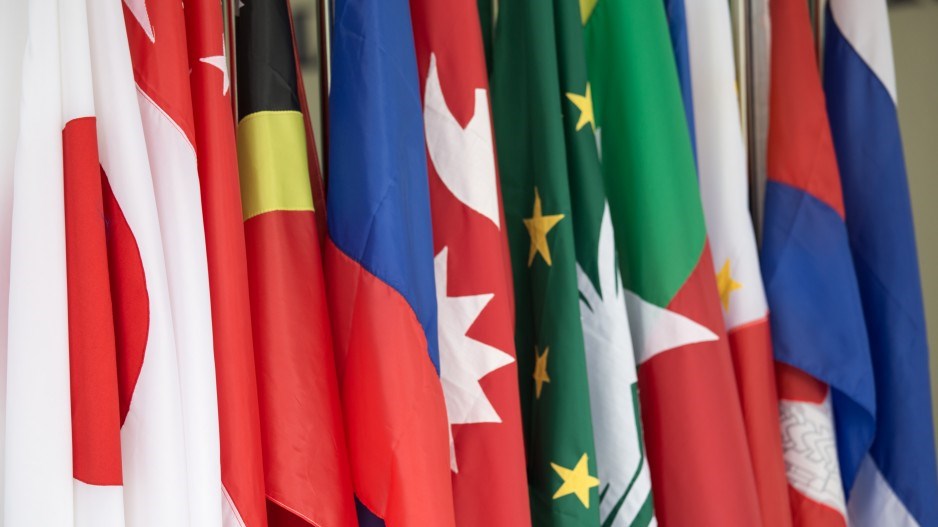B.C. businesses targeting Asia in 2020 would be wise to take note of the region’s geopolitical and economic developments, because Asia’s market access and trade policies have become increasingly intertwined with politics.
That’s the message from Asia Pacific Foundation of Canada (APFC) experts, who, in the organization’s 11 Things to Watch in 2020 dispatch, highlighted several topics that are essential for B.C. firms to track.
But only two of the 11 are specifically economic points: Asia’s increasing digital connectivity and Southeast Asia’s tech-driven financial rise.
While controversial issues like Beijing’s actions in Hong Kong and Xinxiang’s Uyghur-majority region and India’s decision to integrate the previously autonomous regions of Jammu and Kashmir are more socio-political, researchers say they are key points Canadian companies need to be familiar with before making major decisions about Asian business opportunities.
Charles Labrecque, research manager at the Asia Pacific Foundation, said the discussion about Kashmir is a good example of geopolitical news potentially guiding a company’s (or Ottawa’s) considerations for business ties.
“We’ve been hearing for quite a few years that Canada should try to finalize a free-trade agreement with India, and that Canada should work more with like-minded, democratic countries like India,” Labrecque said. “So it’s really worrying to hear what’s happening there right now, in another democracy.… And I don’t think there has been enough coverage here, but for a huge economy, a huge market that Canada’s trying to build a relationship with, there are some worrying trends that we should be paying more attention to.”
For example, the APFC report pointed to Taiwan’s January 11 presidential election, which was won by incumbent Tsai Ing-wen of the pro-independence Democratic Progressive Party over Han Kuo-yu of the pro-status-quo nationalist KMT, as an indicator of the general geopolitical mood in East Asia for the coming years.
Specifically, Labrecque said people should keep an eye on the reaction from Beijing.
China considers Taiwan a rebel province that needs to be reunified with the mainland. Taiwan maintains its own government, military and democratic political system, despite being recognized as a country by only 15 other countries.
“The tone that China takes following the Taiwan election is going to be very indicative of Beijing’s overall policy towards Taiwan in the next five, six years,” Labrecque said. “I think Taiwan has always been one of the most important situations to gauge China’s relationship with the U.S., of how things are going to evolve. While Hong Kong has taken a lot of attention on that front, the Taiwan election and its aftermath will be important indicators for the region as a whole.”
On January 12, one day after Tsai’s re-election, the Chinese foreign ministry issued a statement reiterating Beijing’s claims: “No matter what changes there are to the internal situation in Taiwan, the basic fact that there is only one China in the world and Taiwan is part of China will not change.”
Meanwhile, there are already reports of countries like the Czech Republic incurring angry responses from Chinese officials for ties with Taiwan and its municipal governments.
As of 2018, China is Canada’s second-largest trading partner at $27 billion in exports to the Asian country; Taiwan ranks 13th with about US$2 billion in Canadian exports.
Given the large role China plays in Canadian international trade, it isn’t surprising that five of the 11 topics on the APFC’s list pertain directly to China or in areas where Beijing has expressed its “core interests.” That includes, beyond Taiwan, Hong Kong and Xinjiang, its expansion of reach into the islands in the South China Sea, as well as growing allegations of interference in places like Australia and New Zealand – as well as in Canada.
The issue is further complicated by Huawei Technologies Co. Ltd.’s effort to participate in Canada’s 5G network and the strong opposition to that participation in Canadian national security circles, and the arrest and extradition process of Huawei CFO Meng Wanzhou in Vancouver.
“It’s a debate we really haven’t had here,” Labrecque said. “But we think that’s going to happen, especially with the parliamentary committee in place to discuss specifically on that topic.”
There are a number of topics on APFC’s list that don’t touch on China. They include the “war on drugs” in the Philippines, which has killed at least 6,000 people since 2016, as well as Japan taking an increasing leadership role in Asia geopolitics in the wake of the United States largely pulling back from multilateral efforts in the region after Donald Trump took office.
Such topics nonetheless conform to the general trend that geopolitics have intertwined with business, and Canadians would be wise to take note, officials said.
“Japanese-backed projects in Southeast Asia’s six biggest economies [Indonesia, Malaysia, Philippines, Singapore, Thailand and Vietnam] were valued at US$367 billion, well above China’s tally of US$255 billion,” the APFC’s report said. “An active Japan is nothing but beneficial for Canada, so in 2020 we should be looking for creative ways to revitalize our ties, whether it be via [the Comprehensive and Progressive Agreement for Trans-Pacific Partnership], our 79 sister cities or through our strong people-to-people ties.”
The full report can be read at asiapacific.ca/publication/year-review. •




